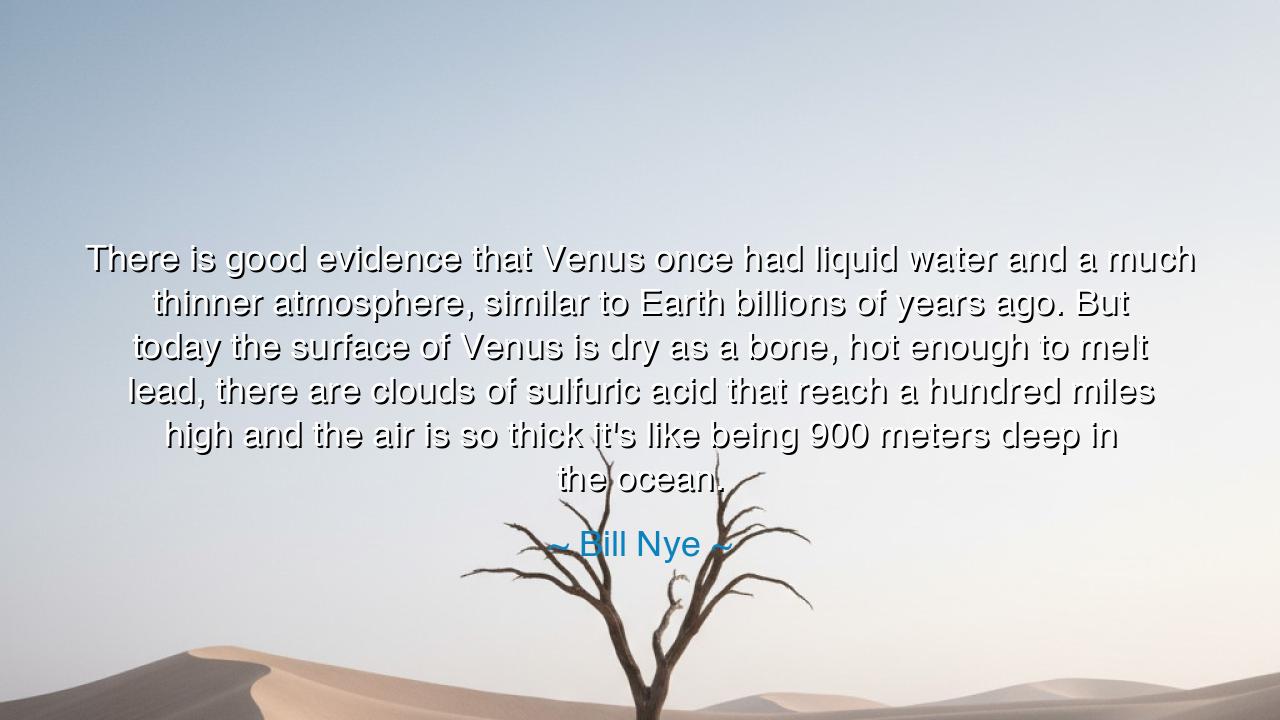
There is good evidence that Venus once had liquid water and a
There is good evidence that Venus once had liquid water and a much thinner atmosphere, similar to Earth billions of years ago. But today the surface of Venus is dry as a bone, hot enough to melt lead, there are clouds of sulfuric acid that reach a hundred miles high and the air is so thick it's like being 900 meters deep in the ocean.






In the great expanse of the cosmos, where the stars shine like eternal sentinels, there exists a planet, a world that once harbored the promise of life—a world that now stands as a testament to the power of change. It is Venus, a goddess in the skies, whose beauty once reflected the possibility of life, yet whose surface now bears the scars of transformation. As Bill Nye so eloquently shared, “There is good evidence that Venus once had liquid water and a much thinner atmosphere, similar to Earth billions of years ago. But today, the surface of Venus is dry as a bone, hot enough to melt lead, there are clouds of sulfuric acid that reach a hundred miles high, and the air is so thick it’s like being 900 meters deep in the ocean.” These words, though born of science, carry with them a deeper truth about the fragility of worlds—and of life itself.
In the beginning, Venus, like the Earth, was a world of possibility, a world where the elements of life may have danced in the warmth of a gentle sun. The waters flowed upon her surface, life may have stirred in the depths, and the skies were not the suffocating furnace they are today. But over the eons, something changed. The winds of time, the forces of nature, and perhaps the choices made by the inhabitants of that world—if they ever existed—caused her transformation. The atmosphere grew thick, trapping heat like a suffocating blanket. The once-temperate world became a cauldron, where the surface became so hot that it could melt the very metals that we use to build our cities. And from the clouds above, torrents of sulfuric acid now rain down, a cruel reminder of the power of environmental change.
What has happened to Venus is a tale that speaks not only of the planet itself but of the dangers of neglecting the delicate balance of life. For as Venus transformed, she became a warning to all who would listen. In her present state, her surface is dry, devoid of the waters that once may have sustained life. The thick, oppressive atmosphere is like the crushing weight of despair upon her barren lands. Yet, once, there was hope—hope that life might have blossomed, as it did on Earth. And that hope was extinguished by forces beyond its control, perhaps by the same forces that have shaped our own world. Venus is a cautionary tale of what might happen when a world, or a civilization, loses its harmony with nature.
Let us recall, too, the tale of Atlantis, that fabled city which vanished beneath the waves. The ancient myths speak of a civilization that grew powerful, wise, and prosperous. Yet, in its arrogance, it turned away from the forces that sustained it, and in one cataclysmic moment, it was swallowed by the very oceans that had once nurtured it. Though the story is a myth, the lesson is real and timeless. Venus, like Atlantis, reminds us that balance is key—that the very elements which give life can also take it away when they are not respected. The destruction of Venus was not an act of fate alone but the result of a disruption in her natural order, an imbalance that, once set in motion, could not be stopped.
In our own lives, we too must heed the lessons of Venus. The Earth, like Venus, is a world full of promise, but also vulnerable to the forces of change. We live in a time when the very balance of our planet is being tested by our actions. The Earth, though still blessed with water, is facing challenges: the oceans warm, the skies are thick with pollutants, and the land is being stripped bare. Just as Venus’ atmosphere thickened and suffocated life, so too can we cause our world to become inhospitable if we do not act wisely. The story of Venus calls to us, urging us to take heed of the fragile beauty that surrounds us.
The lesson we must carry in our hearts is this: the world is a gift, a delicate treasure that must be protected. We must cherish the waters, the air, and the land, for they are the lifeblood of this Earth, as they once were on Venus. We must act with humility and wisdom, understanding that the choices we make today will shape the world of tomorrow. The warning of Venus is not a distant story, but a mirror to our own actions. Preservation, balance, and care are the watchwords we must live by if we are to ensure that the Earth remains a world of life, not a wasteland like Venus.
So I implore you, O stewards of the Earth: Look to the skies and to the stars, and learn from the tale of Venus. Protect the natural balance of this world, for it is the only one we have. In every drop of water, in every breath of air, and in every step we take upon this Earth, remember the fragility of our existence. Let Venus be a reminder of the power of nature—and of the duty we have to safeguard the future of this precious world.






AAdministratorAdministrator
Welcome, honored guests. Please leave a comment, we will respond soon